June marked the 25th Anniversary of Gramercy! Thank you to our valued investors, trusted business partners and team members without whom this milestone could not have been reached. We are excited for the opportunities we see ahead, and look forward to continuing to deliver upon our mission to have a positive impact on the well-being of our clients, portfolio investments (and their communities) and our team members.
Contents
Market Overview
Macro Review
The ECB raised interest rates for a tenth consecutive time to 4.0%. That’s 450bps in 15 months and the highest since the ECB’s creation, as well as the fastest pace of tightening ever. For those who were surprised, Governor Klaas had said on Tuesday that investors were “maybe” underestimating the likelihood of an increase in borrowing costs. A weaker EUR remains the status quo nevertheless. With more noise around 1.05, the focus shifts to oil becoming a material drag and the next major risk, along with elevated natural gas prices. The weak growth picture is already well understood. The Bank of Japan’s governor had also expressed a more hawkish view and implied an early end of the negative interest rate policy. Expectations of ending the yield curve control policy have subsequently been brought forward, just as the five-year JGB auction recorded its best metrics since 2021. U.S. Treasuries generally edged up through the week, as crude oil made fresh YTD gains, just as the USD rose for a ninth consecutive week. For oil, the IEA stated that Saudi oil cuts could threaten a surge in price volatility, while also noting that inventories are at 13-month lows. This statement corroborated with OPEC noting that the oil market will likely face a 3.3m barrel per day shortfall in the fourth quarter. Should oil continue to build on the near 10% monthly move, then U.S. break-evens could risk breaking to the upside. Indeed, the story of CPI beating expectations is noteworthy, as further upside in retail sales and PPI stood out. Meanwhile, UK GDP missed expectations and came in negative at 0.5%, just as GS and JPM downgraded 2023 growth forecasts. German growth predictions for 2023 were revised down to -0.3% and the ECB now forecasts inflation remaining above 3% in 2024. These were not surprising developments, given the German ZEW survey fell to a 3-year low. Positive tailwinds were associated with Turkey as Fitch revised the rating outlook to stable from negative, just as the Central Bank raised the RRR for FX-linked deposits to 25%. The key will be whether the CBRT increases interest rates again on Thursday. South Korea’s unemployment rate on a seasonally adjusted basis unexpectedly dropped to a record low of 2.4%. Sri Lanka’s local bond restructuring scheme is progressing well as the first review of the IMF program is underway. Senegal’s President Sall has backed his Prime Minister Amadou Ba to succeed him after the 2024 elections, which paves the way for a smooth transition. On the flipside, Ecuador Presidential Candidate, Daniel Noboa, did say he would use $1.5bn of foreign reserves to help offset the effects of El Niño.
EM Credit Update
Emerging market sovereign credit (cash bonds) ended the week up 0.1% with credit spreads 2bps tighter. Sovereign outperformers were Zambia, Ghana and Sri Lanka, while Tunisia, Ethiopia and Ecuador underperformed. One of the top corporate sector performers was oil & gas given the strong commodity performance over the week.
The Week Ahead
Developed market central bank decisions are the obvious theme next week. The Fed will deliver its key FOMC update, just as the Bank of England, Bank of Japan, Norges Bank, Riksbank and Swiss National Bank will update policy rates. After the ECB’s latest 25bps hike, Eurozone CPI will be published. A secondary focus will be on China’s PBoC, and instead on the one-year (3.45%) and five-year (4.20%) Loan Prime Rates, rather than anticompetitive measures with the U.S. and Europe. Other key EM interest rate decisions are due from Brazil (13.25%), Costa Rica (6.5%), Egypt (19.25%), Indonesia (5.75%), Philippines (5.75%), South Africa (8.25%) and Turkey (25.0%). Inflation data is expected from Brazil, Czech Republic, Poland and South Africa. Then the UK and Canada inflation releases could have the ability to move core rates. Other releases include Argentina GDP and Mexican retail sales. Finally, the JPM Emerging Market Conference will take place next week in London.
Highlights from emerging markets discussed below: Ecuador’s Presidential Candidates eye FX reserves for post-election spending, but dollarization regime is likely to limit credit-negative tendencies; Beijing delivers another RRR cut to support lending activity and fiscal stimulus efforts; and Early elections could help resolve political uncertainty in Egypt but push reforms down the road.
Fixed Income
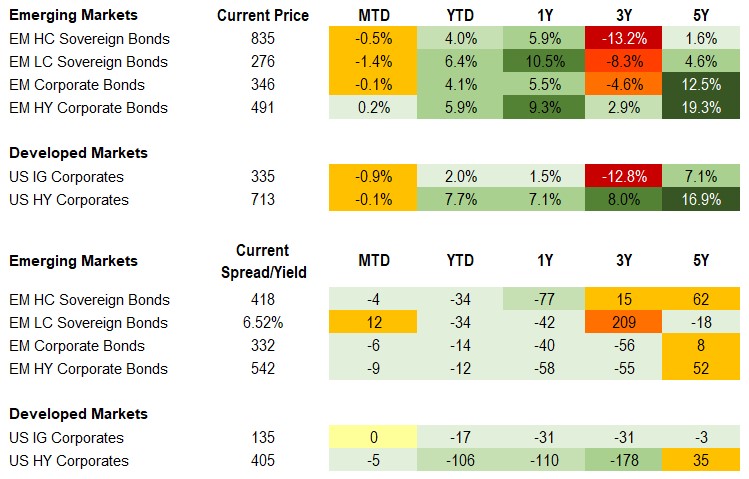
Equities
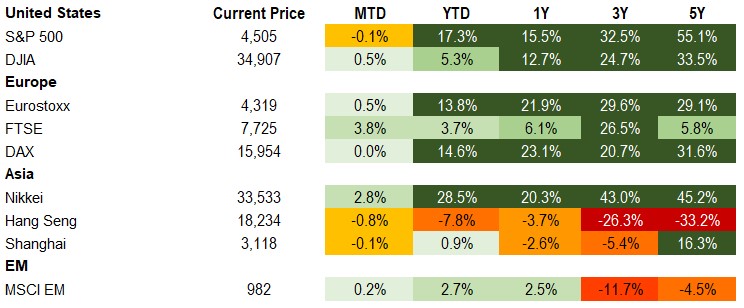
Commodities

Source for data tables: Bloomberg, JPMorgan, Gramercy. EM Fixed Income is represented by the following JPMorgan Indicies: EMBI Global, GBI-EM Global Diversified, CEMBI Broad Diversified and CEMBI Broad High Yield. DM Fixed Income is represented by the JPMorgan JULI Total Return Index and Domestic High Yield Index. Fixed Income, Equity and Commodity data is as of September 15, 2023 (mid-afternoon).
Emerging Markets Weekly Highlights
Ecuador’s Presidential Candidates eye FX reserves for post-election spending, but dollarization regime is likely to limit credit-negative tendencies
Event: Daniel Noboa, the center-right Presidential Candidate who will face left-wing Luisa Gonzalez, a proxy for exiled former President Rafael Correa, in Ecuador’s Presidential Elections run-off on October 15th surprised markets this week with comments in front of local media that he would be open to using $1.5bn from FX reserves to mitigate the potential social and economic impact of the “El Niño” weather phenomenon.
Gramercy commentary: Mr. Noboa is a 35-year-old heir of one of Ecuador’s wealthiest families and is considered to be the market-friendly and economically conservative candidate. Noboa surprised markets with his comments which resembled quite closely those of his Correista opponent Gonzalez who had previously expressed intentions to allocate up to $2.5bn from FX reserves to support the economy in the face of potential negative impacts from “El Niño”. Ecuador’s FX reserves rose to a recent record high of around $9bn in 2022 supported by ex-President Lasso’s policies and the IMF program, anchoring external and domestic market confidence, but have since declined to around $7bn as of July this year. Further erosion in the external buffer of Ecuador’s dollarized economy would be a credit-negative development. However, for the time being, we are inclined to interpret Noboa’s statements as election posturing in front of a domestic audience rather than actual economic policy intentions. In the coming weeks until the October 15th runoff, we will be vigilant for signals by Noboa’s team on more specifics around their main post-election economic priorities. In the meantime, despite the post-first round rally on Noboa’s improving prospects to defeat Luisa Gonzalez, sovereign bond prices remain deeply distressed and continue to reflect a sharp shift to heterodox economic policy management. This is something we see as unlikely, partly also due to the restraints imposed on any government by Ecuador’s dollarization regime.
Beijing delivers another RRR cut to support lending activity and fiscal stimulus efforts
Event: The PBOC has announced a universal RRR cut of 25bps on September 14th, the second decrease after March this year.
Gramercy commentary: The cut in the reserve requirement ratio is intended to maintain adequate liquidity as banks are extending more credit to corporations and to lower liability costs for banks. It is part of continuing efforts by the authorities in Beijing to provide incremental macro support while maintaining the structural goal of overall deleveraging within the economy. While incremental supply side measures are supportive for credit extension and general economic activity, the demand side story remains less constructive as some households face lower incomes, particularly across the finance and technology sectors, and appear to feel less optimistic about their “economic prospects” as reflected in recent PMI readings. This has been a drag on China’s post-COVID recovery in general and the important property sector in particular. Against this backdrop, markets remain hopeful that further support measures by the central government are in the pipeline. We are of the view that while the authorities’ structural goal to reduce the property sector’s role in the economy remains intact, some additional support measures for the industry could materialize in the near-term but a more holistic resolution is likely to spill into 2024.
Early elections could help resolve political uncertainty in Egypt but push reforms down the road
Event: Egypt is considering holding Presidential Elections before the end of 2023, sources claim. Subject to change, candidate registrations could begin in October with voting taking place in early December.
Gramercy commentary: Holding Presidential Elections earlier than 1Q 2024 as previously expected should help resolve political uncertainty sooner, which would be welcomed by markets. However, it might also delay important reforms required by the IMF under Egypt’s $3bn Extended Fund Facility program signed last year. Some of the main issues on the agenda include the adoption of a flexible exchange rate system, addressing hard currency shortages, declining FX reserves, record high inflation, and privatization of state-owned assets, among others. A pause in addressing these issues could lead to further delays in the second IMF review that has been on hold since March and the associated tranche worth about $354m. It has been the markets’ perception that the current period (September-October) would be ideal for implementing some of the tougher reform measures ahead of the window closing before elections in early 2024. Now, this timeframe could change. Additionally, the IMF will likely also want to see a credible timetable for clearing the stock of external arrears (estimated $5.5bn import bill plus $3bn owed to IOCs). Resuming the IMF program could unlock additional financing from GCC, boosting market confidence and sovereign bond prices. Conversely, a lack of IMF agreement/financing would likely exert downward pressure on prices and could also trigger rating downgrades and rekindle speculation around potential debt restructurings.
Emerging Markets Technicals
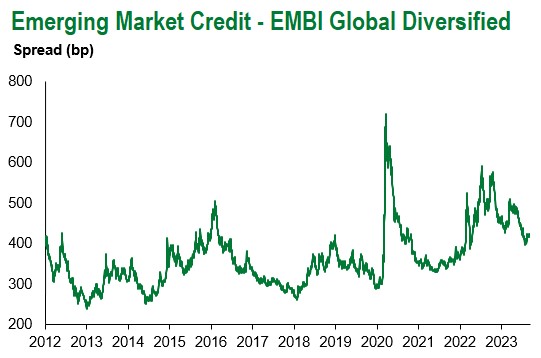
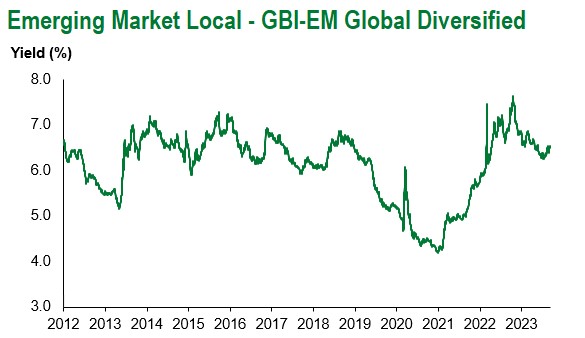
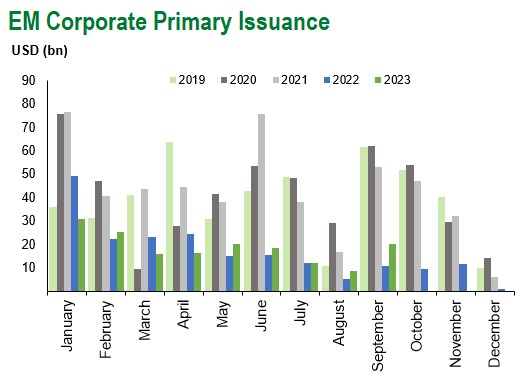
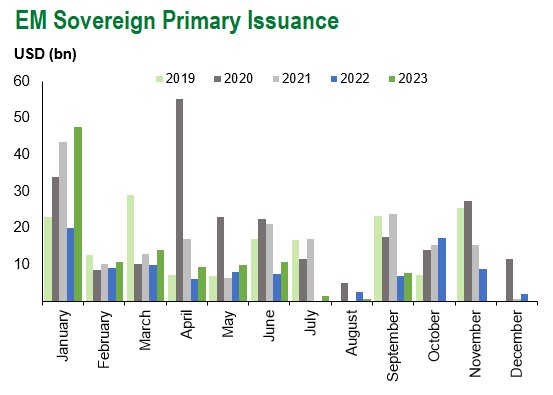
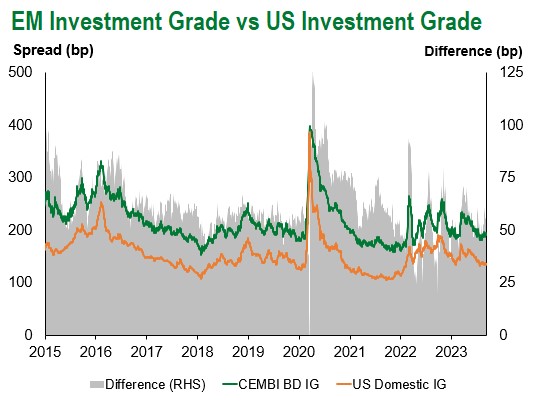
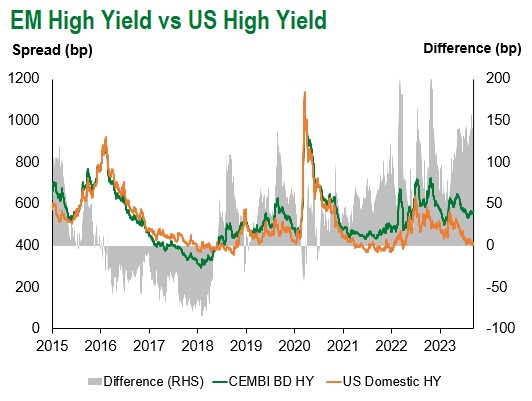
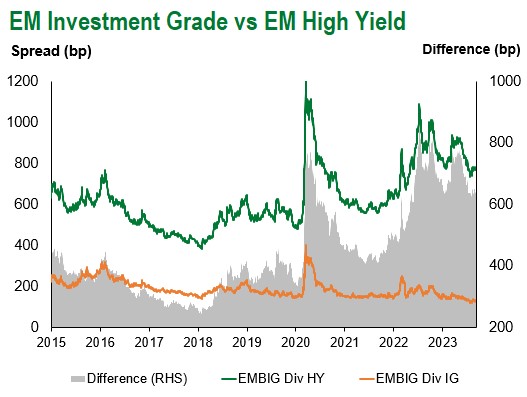
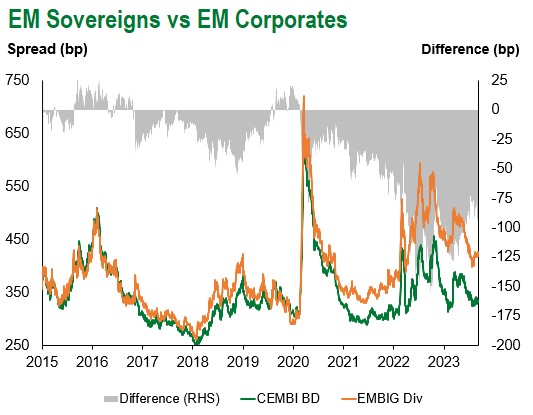
Emerging Markets Flows
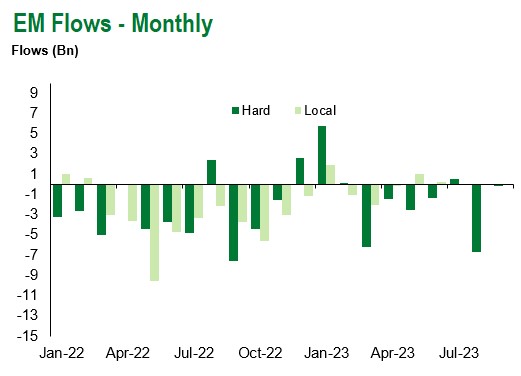
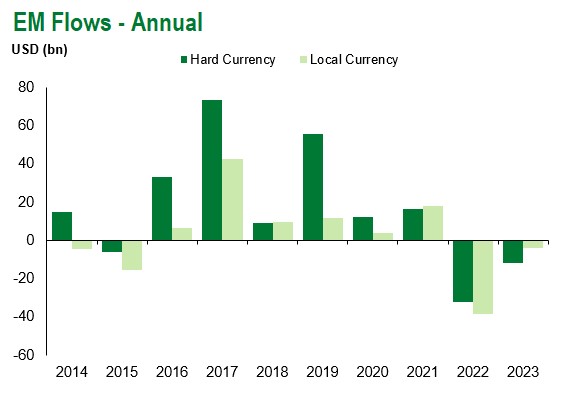
Source for graphs: Bloomberg, JPMorgan, Gramercy. As of September 15, 2023.
For questions, please contact:
Kathryn Exum, CFA ESG, Director, Co-Head of Sovereign Research, [email protected]
Petar Atanasov, Director, Co-Head of Sovereign Research, [email protected]
James Barry, Director, Deputy Portfolio Manager, [email protected]
This document is for informational purposes only. The information presented is not intended to be relied upon as a forecast, research or investment advice, and is not a recommendation, offer or solicitation to buy or sell any securities or to adopt any investment strategy. Gramercy may have current investment positions in the securities or sovereigns mentioned above. The information and opinions contained in this paper are as of the date of initial publication, derived from proprietary and nonproprietary sources deemed by Gramercy to be reliable, are not necessarily all-inclusive and are not guaranteed as to accuracy. This paper may contain “forward-looking” information that is not purely historical in nature. Such information may include, among other things, projections and forecasts. There is no guarantee that any forecasts made will come to pass. Reliance upon information in this paper is at the sole discretion of the reader. You should not rely on this presentation as the basis upon which to make an investment decision. Investment involves risk. There can be no assurance that investment objectives will be achieved. Investors must be prepared to bear the risk of a total loss of their investment. These risks are often heightened for investments in emerging/developing markets or smaller capital markets. International investing involves risks, including risks related to foreign currency, limited liquidity, less government regulation, and the possibility of substantial volatility due to adverse political, economic or other developments. References to any indices are for informational and general comparative purposes only. The performance data of various indices mentioned in this update are updated and released on a periodic basis before finalization. The performance data of various indices presented herein was current as of the date of the presentation. Please refer to data returns of the separate indices if you desire additional or updated information. Indices are unmanaged, and their performance results do not reflect the impact of fees, expenses, or taxes that may be incurred through an investment with Gramercy. Returns for indices assume dividend reinvestment. An investment cannot be made directly in an index. Accordingly, comparing results shown to those of such indices may be of limited use. The information provided herein is neither tax nor legal advice. Investors should speak to their tax professional for specific information regarding their tax situation.
